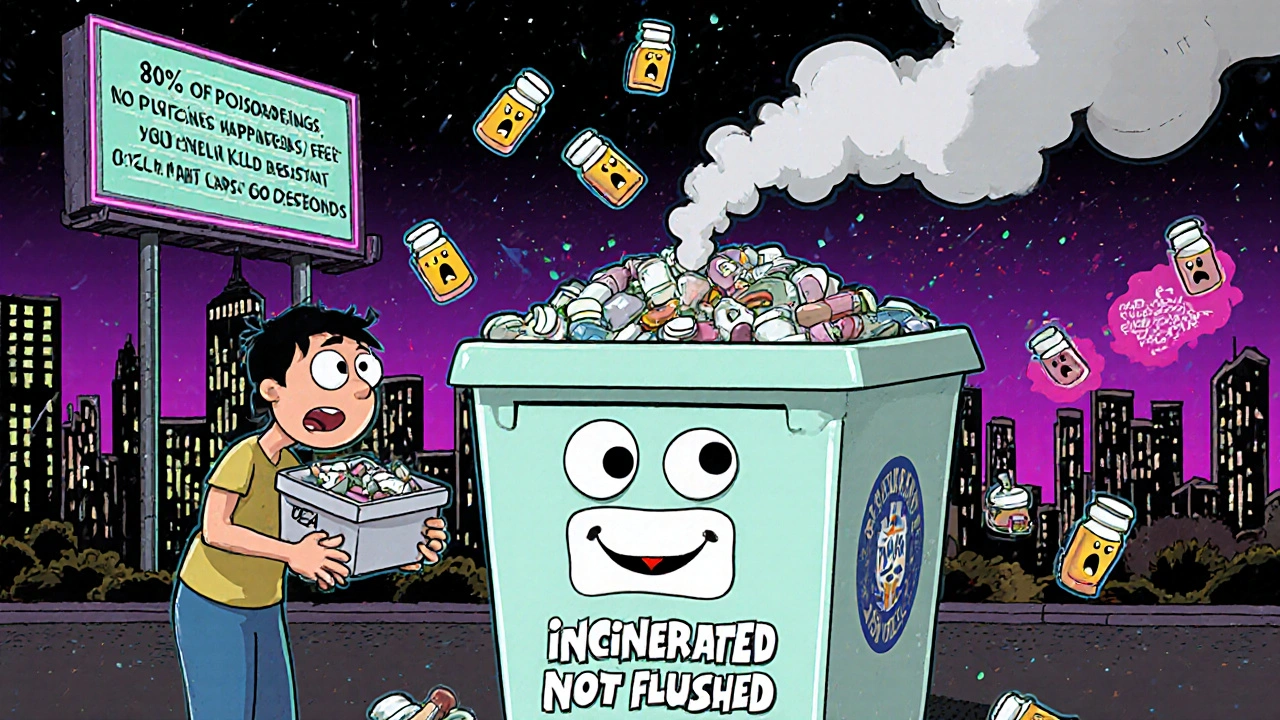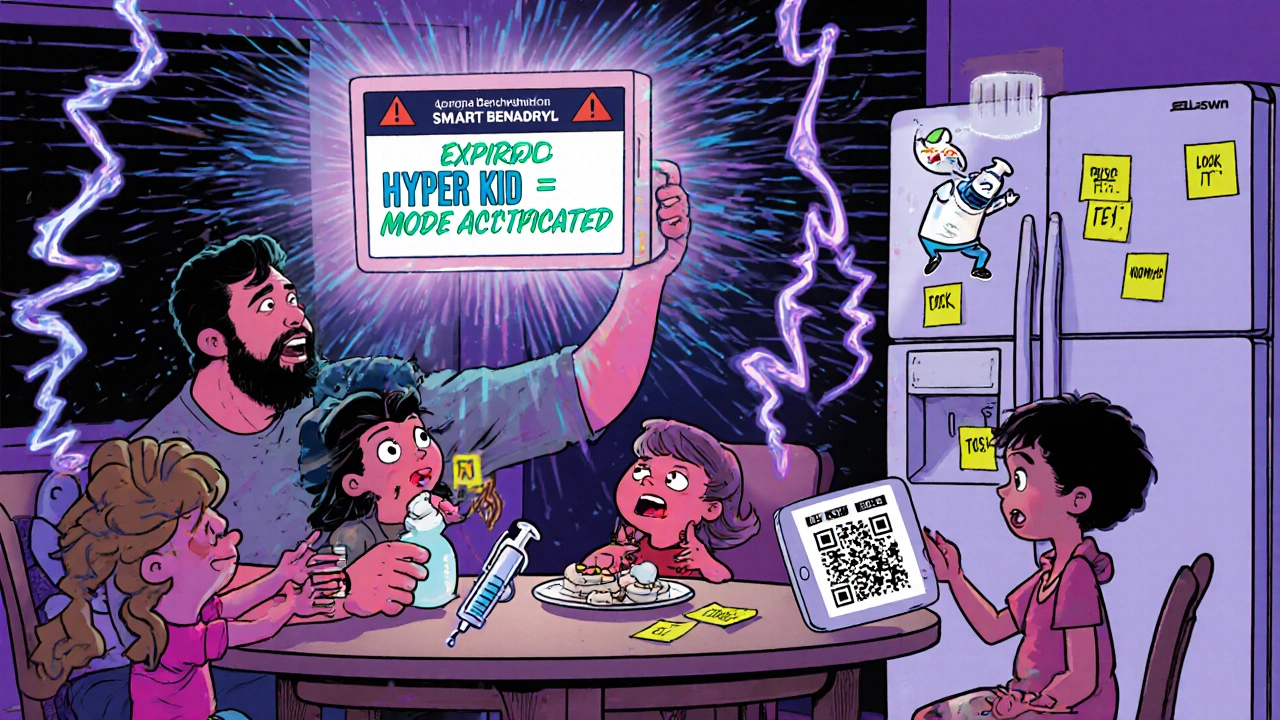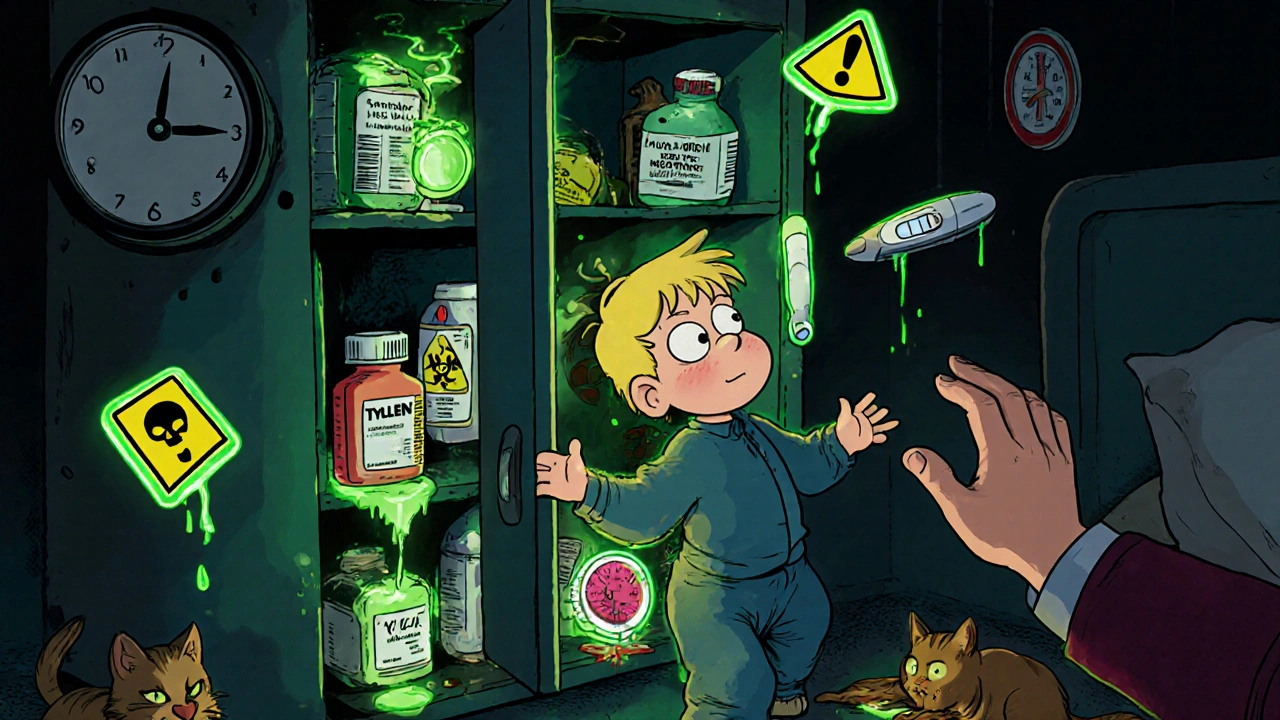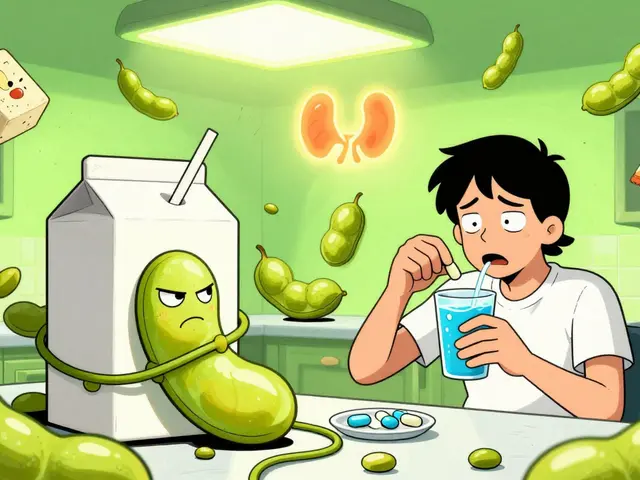Every year, thousands of children end up in emergency rooms because they got into a medicine they weren’t supposed to. Many of those cases involve expired pediatric medications-drugs that parents thought were still safe, or didn’t even realize had passed their expiration date. The truth is, giving a child medicine past its expiration date isn’t just risky-it can be dangerous. And most parents don’t know how to handle it properly.
Why Expired Pediatric Medications Are Different
Children aren’t small adults. Their bodies process medicine differently. A pill that’s just weak in an adult might turn toxic in a child. The FDA warns that expired pediatric drugs can lose effectiveness, break down into harmful chemicals, or even grow bacteria. Liquid antibiotics, for example, can become contaminated with bacteria within 14 days after opening-even if the bottle still says it’s good for another year. One study found that 87% of liquid antibiotics lose potency after expiration, and 33% develop bacterial growth after just two weeks. Insulin, epinephrine auto-injectors, and nitroglycerin are especially risky. Epinephrine, used in allergic emergencies, drops to only 65% effectiveness six months past expiration. That’s not just ineffective-it’s life-threatening. Tetracycline antibiotics, when expired, can cause permanent tooth staining and stunt bone growth in kids at rates 3.7 times higher than when used properly. Even common OTC meds like children’s Tylenol or Benadryl aren’t safe past their date. Expired antihistamines can cause the opposite of what they’re meant to-making kids hyperactive instead of sleepy. Benzocaine teething gels have been linked to 127 cases of methemoglobinemia-a rare but deadly blood condition-in children between 2018 and 2022. That’s why the American College of Medical Toxicology says: no expired medication should ever be given to a child under 12.How Most Parents Handle Expired Meds (And Why It’s Wrong)
A 2023 survey of 1,200 parents found that only 37% believed expired OTC meds were dangerous. The rest? 20% thought it was fine to use them within a month of expiration. Another 14% said three months. 15% said a year or more. On Reddit, one parent wrote: “I always thought expired kids’ Tylenol was just weaker, not dangerous.” That’s the mindset that gets kids hurt. Parents often store meds in obvious places-bathroom cabinets, kitchen counters, dresser drawers. But 78% of poisoning cases happen when meds are stored below 5 feet. And while 98% of prescription bottles have child-resistant caps, testing shows 62% of kids aged 4-5 can open them in under a minute. Even worse: 42% of parents use kitchen spoons to measure doses instead of the provided syringes or cups. That leads to 38% dosing errors. Add expired meds into the mix, and you’ve got a recipe for disaster. Another big problem? Storage conditions. Acetaminophen suspension loses 22% of its strength if kept above 86°F for 30 days. That’s easy to do in a hot bathroom or a sunlit cabinet. Liquid meds that need refrigeration? They’re only good for 7-14 days after opening, no matter what the bottle says.What You Should Do With Expired Pediatric Medications
The safest, most responsible way to dispose of expired pediatric meds is through a drug take-back program. The DEA runs over 16,700 permanent collection sites-at pharmacies, hospitals, and police stations. You don’t need an appointment. Just drop off your old meds. They’re collected, incinerated safely, and don’t end up in landfills or waterways. If you can’t get to a take-back site, here’s what to do:- Take the medicine out of its original bottle.
- Scratch out your name, the child’s name, and the prescription number with a permanent marker. (97% of parents skip this step-making it easy for someone else to find and use them.)
- Mix the pills or liquid with something unappetizing: used coffee grounds, kitty litter, or dirt. Use a 2:1 ratio-two parts dirt or grounds to one part medicine.
- Put the mixture in a sealed plastic bag or container.
- Throw it in the trash.

How to Prevent This From Happening Again
Prevention is the best medicine. Start by auditing your medicine cabinet every month for liquid meds and every three months for pills. Check expiration dates. Toss anything expired, discolored, or smelling odd. Store all meds-yes, even vitamins and topical creams-in a locked cabinet, at least 5 feet off the ground. Only 22% of households do this. But the CDC says it cuts poisoning risk by 76%. Use child-resistant caps and make sure they’re snapped shut every time. Keep meds in their original containers. Only 58% of parents do this. But the label has vital info: dosage instructions, expiration date, and warnings. If you throw pills into a random jar, you lose that protection. Talk to your pediatrician. Only 31% of providers discuss disposal at well-child visits. Ask them to show you how to safely store and dispose of meds. Some clinics now offer free disposal kits.What’s Changing in Pediatric Medication Safety
New systems are rolling out to help. Walgreens and CVS now have over 12,400 permanent disposal kiosks-up 47% since 2023. The CDC’s MedEd program has trained over 18,500 healthcare providers to talk to parents about safe storage and disposal. And in 2024, 15% of pediatric prescriptions started including QR codes that link to disposal videos. Smart cabinets that track expiration dates and send phone alerts are hitting the market. The pediatric medication safety market is expected to hit $4.7 billion by 2026. That’s because more parents are waking up to the risks. States are also stepping up. Right now, only 38% have strong disposal laws. But federal legislation is being considered to make take-back programs mandatory nationwide. The goal? Reduce expired-medication-related ER visits by 75% by 2030.
What to Do If Your Child Gets Into Expired Medicine
If your child swallows an expired pill or liquid, don’t wait for symptoms. Call Poison Control immediately at 1-800-222-1222. They’re available 24/7 and free. Don’t try to make them vomit. Don’t give them milk or food unless instructed. Just have the medicine container ready when you call. If they’re having trouble breathing, turning blue, or are unconscious, call 911 right away. Time matters.Final Thought
You don’t have to be perfect. But you do have to be careful. A single expired children’s cough syrup can turn a routine cold into an emergency. A forgotten bottle of antibiotics in the back of a drawer can lead to a resistant infection-or worse. Take five minutes today. Go to your medicine cabinet. Look for anything with an old date. Toss it safely. Lock up what’s left. Talk to your kid’s doctor about it next time you’re in. That’s how you protect them-not with fear, but with action.Can I still give my child medicine that expired last month?
No. Even if it’s only been a few weeks past the expiration date, the medicine may have lost effectiveness or broken down into harmful substances. Children’s bodies are more sensitive, and expired meds can cause unexpected side effects, including toxicity. Always dispose of expired pediatric medications properly instead of risking use.
Is it safe to flush expired children’s medicine down the toilet?
Only if it’s on the FDA’s official flush list-which includes very few pediatric medications. Most children’s medicines, like Tylenol, antibiotics, or allergy syrups, should never be flushed. Flushing pollutes water supplies and harms the environment. Instead, use a drug take-back program or mix the medicine with coffee grounds or kitty litter before throwing it in the trash.
Where can I find a drug take-back location near me?
The DEA operates over 16,700 permanent collection sites across the U.S., mostly at pharmacies like CVS, Walgreens, and local police stations. You can find your nearest location by visiting the DEA’s Diversion Control Division website or calling their hotline. Many sites accept medications year-round-no appointment needed.
What should I do with empty medicine bottles?
Remove or scratch out all personal information on the label-name, prescription number, dosage-before recycling. Most plastic bottles are recyclable, but only after the label is fully obscured. This prevents identity theft and keeps old prescriptions from being misused. If you’re unsure, throw the bottle in the trash after removing the cap and label.
Are vitamins and supplements safe to keep past their expiration date?
While most vitamins don’t become toxic after expiration, they lose potency over time. For children, this means they might not get the intended benefit. More importantly, they’re still a poisoning risk if a child gets into them. Store them securely and dispose of expired ones the same way as other meds-through a take-back program or mixed with grounds in the trash.







Comments
Ross Ruprecht
November 24, 2025 AT 03:18 AMUgh, another ‘safe disposal’ lecture. I just toss old kids’ meds in the trash like my mom did in the 90s. No one’s dying from a little expired Tylenol.
Vivian C Martinez
November 25, 2025 AT 05:44 AMActually, that’s exactly why this post matters. Kids don’t know the difference between candy and medicine. I used to keep bottles on the counter until my niece opened one and ended up in the ER. Now I lock everything up and toss expired stuff at the pharmacy dropbox. Simple, safe, and zero regrets.
Karla Morales
November 25, 2025 AT 18:43 PMLet’s be real: 87% of liquid antibiotics lose potency? That’s not just a warning-it’s a public health failure. 🚨 The FDA should be forcing manufacturers to include expiration dates on the *cap*, not just the bottle. And why aren’t pharmacies offering free disposal as standard? This is 2024, not 1994. 🤦♀️
Laurie Sala
November 26, 2025 AT 05:46 AMMy kid’s pediatrician never mentioned this... and now I feel like a terrible parent. 😭 I had a whole drawer full of expired cough syrup and Benadryl. I just threw it all away today. Thank you for making me feel guilty in the best possible way.
Javier Rain
November 26, 2025 AT 14:16 PMStop waiting for the system to fix this. Take five minutes. Audit your cabinet. Lock it. Toss the junk. You don’t need a PhD to protect your kid. Just do it. And if you’re too busy, your kid’s safety isn’t a ‘when I get around to it’ thing-it’s a ‘right now’ thing. Go.
Lisa Lee
November 28, 2025 AT 09:07 AMUSA still can’t get basic medicine safety right? Canada’s had mandatory take-back programs since 2017. We don’t let parents gamble with their kids’ lives. Why are we still treating this like a DIY project? 🇨🇦 > 🇺🇸
Charmaine Barcelon
November 30, 2025 AT 00:40 AMSTOP. Just STOP. You’re not supposed to keep kids’ meds past the date. Period. Full stop. No excuses. Not even ‘it’s just a little expired.’ Not even ‘my kid needs it.’ Not even ‘I’m out of cash.’ If it’s expired, it’s trash. Throw it. Lock it. Don’t be that parent.
Adrian Rios
November 30, 2025 AT 06:13 AMOne thing nobody talks about: the psychological burden on parents who’ve had a child ingest expired meds. I’ve seen it. The guilt, the sleepless nights, the constant fear every time you hear a cough or a sneeze. This isn’t just about chemistry or FDA guidelines-it’s about trauma prevention. We need more than disposal instructions. We need community education, school programs, pediatrician checklists. This should be as routine as car seat checks.
Matthew Mahar
December 1, 2025 AT 01:18 AMwait so i can't flush my kid's amoxicillin? but i did that last year... and i thought it was fine?? 😳 i'm so sorry everyone i'm a bad parent
John Mackaill
December 1, 2025 AT 04:45 AMJust had a conversation with my 7-year-old about why we lock the medicine cabinet. She asked, ‘Is it because the bad germs live in the old pills?’ I said yes. She nodded, walked over, and locked it herself. That’s the kind of awareness we need. Not fear. Not guilt. Just simple, clear, daily habits.
Demi-Louise Brown
December 1, 2025 AT 15:14 PMTake-back programs exist. Use them. Locked cabinet. Original bottles. Monthly check. That’s the entire protocol. No drama. No hashtags. Just action. You don’t need a viral post to do the right thing.
Lisa Detanna
December 1, 2025 AT 16:45 PMMy mom’s from the Philippines. She used to save every pill ‘just in case.’ I used to fight with her about it. Now I send her a link to this post every time she tries to give my niece leftover antibiotics. It’s not about being right-it’s about loving someone enough to change their habits. And that’s worth it.